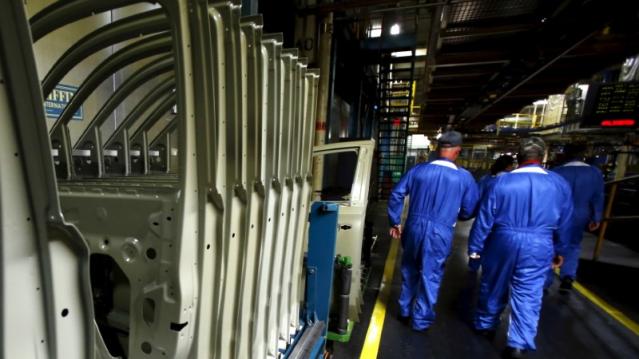Why GM Should Send a Thank You Note to Saudi Arabia

General Motors shares are up more than 4 percent Thursday after the automaker reported better-than-expected profits. The company earned more than $1 billion in profits last quarter, well above Wall Street’s forecasts.
A big reason for the blowout quarter was record margins in North America, thanks in large part to increased sales of trucks and SUVs. The headline at the Detroit Free Press says it all: “GM earns $1.1B in Q2 as pickup, SUV sales surge in U.S.”
Related: What's Next for Oil Prices? Look Out Below!
As a general rule, big pickup trucks and SUVs deliver higher profit margins than smaller, cheaper cars, so Detroit is always happy when large vehicles are selling. Another general rule seems to be that when gas is cheap, Americans start dreaming about gas-guzzling vehicles of all kinds, from blinged-out GMC Yukon XL Denalis to fuel-blasting Chevy Camaro ZL1s. And gas certainly has been cheap lately, thanks in large part to Saudi Arabia’s decision to maintain crude oil production levels in the face of increased U.S. production and a global slowdown in demand for energy.
Here’s a chart of gas and oil prices over the last three years, courtesy of GasBuddy. Note the steep decline starting in 2014:

As long as oil and gas are cheap, GM can probably count on selling lots of its most profitable vehicles. And with China slowing and Iran rejoining the global oil market, cheap fuel may be here for a while.
Top Reads from The Fiscal Times:
- 7 Revelations from Donald Trump’s Financial Disclosure
- The New Generation of ‘Genuinely Creepy’ Electronic Devices
- The Best Things to Charge on Your Credit Card
Small Business Owners Say They’re Raising Worker Pay
A record percentage of small business owners say they are raising pay for their workers, according to the latest monthly jobs report from the National Federation of Independent Business, based on a survey of 10,000 of the group’s members. A seasonally adjusted net 35 percent of small businesses say they are increasing compensation. “They are increasing compensation at record levels and are continuing to hire,” NFIB President and CEO Juanita Duggan said in a statement accompanying the report. “Post tax reform, concerns about taxes and regulations are taking a backseat to their worries over filling open positions and finding qualified candidates.”
The US Is Running Short on More Than 200 Drugs

The U.S. is officially running short on 202 drugs, including some medical staples like epinephrine, morphine and saline solution. “The medications most vulnerable to running short have a few things in common: They are generic, high-volume, and low-margin for their makers—not the cutting-edge specialty drugs that pad pharmaceutical companies’ bottom lines,” Fortune’s Erika Fry reports. “Companies have little incentive to make the workhorse drugs we use most.” And much of the problem — “The situation is an emergency waiting to be a disaster,” one pharmacist says — can be tied to one company: Pfizer. Read the full story here.
Chart of the Day: Could You Handle a Sudden $400 Expense?

More Americans say they are living comfortably or at least “doing okay” financially, according to the Federal Reserve’s Report on the Economic Well-Being of U.S. Households in 2017. At the same time, four in 10 adults say that, if faced with an unexpected expense of $400, they would not be able to cover it or would cover it by selling something or borrowing money. That represents an improvement from 2013, when half of all adults said they would have trouble handling such an expense, but suggests that many Americans are still close to the edge when it comes to their personal finances.
Kevin Brady Introduces Welfare Reform Bill

The Tax Policy Center’s Daily Deduction reports that Rep. Kevin Brady (R-TX), chair of the House Ways and Means Committee on Friday introduced The Jobs and Opportunity with Benefits and Services (JOBS) for Success Act (H.R. 5861). “The bill would rename the Temporary Assistance for Needy Families (TANF) program and target benefits to the lowest-income households. Although the House GOP leadership promised to include an expansion of the Earned Income Tax Credit as part of an upcoming welfare reform bill, this measure does not appear to include any EITC provisions.” The committee will mark up the bill on Wednesday.



